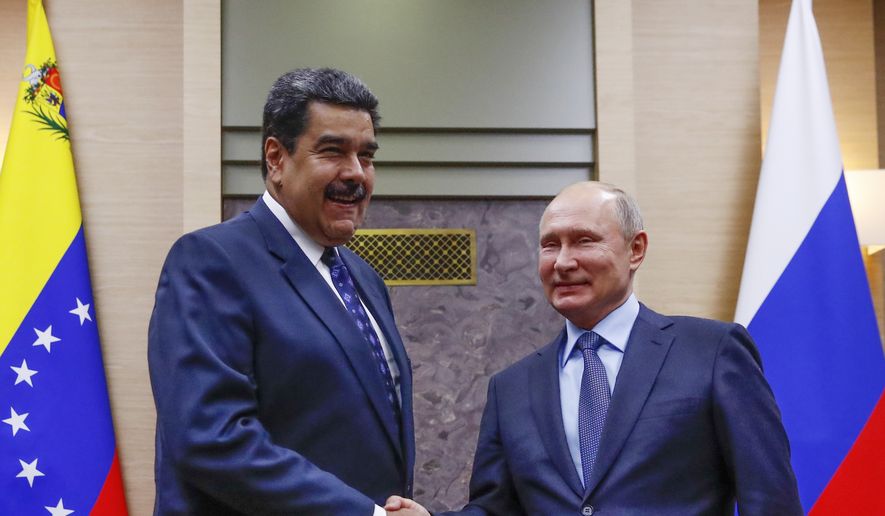OPINION:
While Washington obsesses over the Russia-Trump collusion/obstruction narrative being endlessly bandied about by the media and the Democratic Party (even after the misfire of the Mueller Report’s big gun for the left), the real story of the U.S.-Russia relationship — and that of President Trump and Russian President Vladimir Putin — is playing out this week in far away Venezuela.
Rather than the illicit bromance Mr. Trump’s critics like to fantasize over, the two leaders are engaged in a duel marked by confrontation and violence that will have repercussions for the hemisphere for decades to come.
Mr. Putin may have finally overplayed his hand. After a decade of growing strength and more brazen provocations during the Obama years of appeasement and weakness, the Kremlin has most likely overreached in Venezuela. Mr. Putin’s image, and that of Russia, could soon be dealt a devastating blow.
The Trump administration has made a point of being willing and able to employ the full weight of American power, economic, moral and military, against its adversaries to reclaim American influence in the world. It has become painfully obvious that Mr. Trump, National Security Adviser John R. Bolton and Secretary of State Mike Pompeo aim to remove the regime of socialist President Nicolas Maduro from control of the oil-rich nation. Whatever the short-term results of this week’s uprising, it is only a matter of time before Mr. Maduro is gone.
Russia has flown hundreds of advisers (read: mercenaries of the infamous Wagner Group run by close Putin confidant Yevgeny Prigozhin) into Venezuela to prop up Mr. Maduro and his thugs. Cuba is doing the same, and even China is lending a hand to the regime.
The Russian Air Force also boldly flew long-range nuclear bombers to Caracas last year in a foolish taunt to the Pentagon.
The situation has turned into a geopolitical gunfight at the O.K. Corral, with the Trump White House determined to come out on top, even prepared to use military force to achieve its goal if the internal opposition to Maduro fails. It’s a message our adversaries have received loud and clear.
Russia has also invested heavily in Venezuela’s oil industry, hoping to replicate the successful formula employed in Syria and across Africa: Prop up the existing government in return for access to commodities and mineral rights, bolstering Moscow’s coffers with badly needed foreign currency.
This confrontation with Mr. Trump comes on the heels of multiple American missile launches into Syria, tension with Russia in regards to the fight against Islamic State, and the killing of hundreds of Russian mercenaries in Syria by American air power when they tried to advance on a U.S. Special Forces position in Syria last year.
The problem for Mr. Putin is that he cannot afford a failure in Venezuela, having gone way out on a limb to back Caracas.
Mr. Putin has repeatedly used success in overseas adventures to placate a domestic audience struggling with a recent recession and shrinking prospects for economic security. The Kremlin just this week is also tightening the noose on the internet, the last effective vehicle for ordinary Russians to criticize their government. Even a much-needed pension reform recently pushed through has only contributed to Mr. Putin’s plummeting poll numbers.
The real question now is how far Russia’s leaders are willing to go to support Mr. Maduro. Do they increase their military presence? What happens if the mercenary forces get caught up in a firefight with American proxy forces on the ground? There are already reports that Russian advisers have deployed the S-300 anti-aircraft missile system at a Venezuelan air base to deter American air attack.
Does Russia force a confrontation, one that American air power will surely win? How badly would a loss damage the reputation of Russian military equipment, an important source of foreign revenue for the Kremlin?
The outcome of the Venezuelan crisis will have implications for the Middle East, Africa, and even the “frozen conflict” in eastern Ukraine. Russia would be wise to save face and back down now, avoiding further damage to its reputation and future cash flow. Those, after all, are the two things the Kremlin cares most about.
• L. Todd Wood is a former special operations helicopter pilot and Wall Street debt trader, and has contributed to Fox Business, The Moscow Times, National Review, the New York Post and many other publications. He can be reached through his website, LToddWood.com.




Please read our comment policy before commenting.